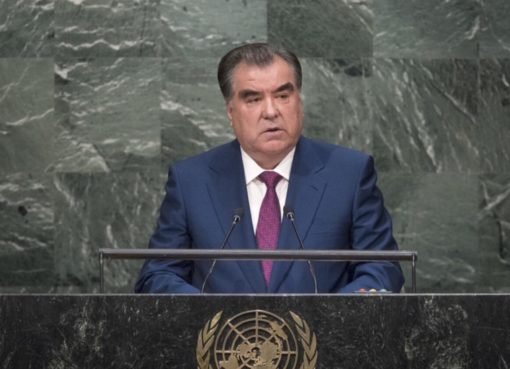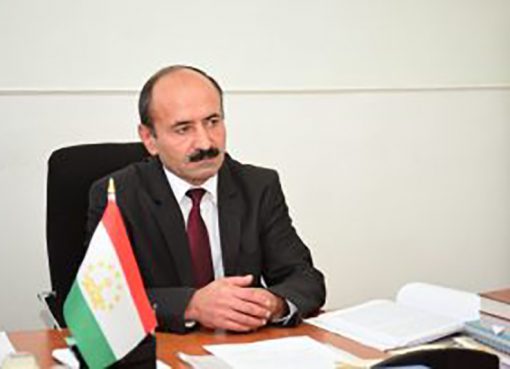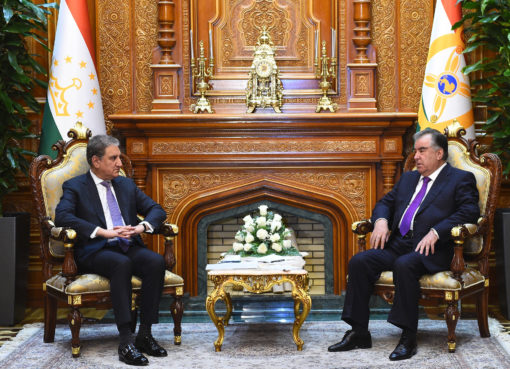High-Level Conference “International and Regional Cooperation on Countering Terrorism and its Financing Through Illicit Drug Trafficking and Organized Crime”
(Dushanbe, 16-17 May 2019)
Dushanbe Declaration
On 16-17 May 2019, a High-Level Conference on “International and Regional Cooperation on Countering Terrorism and its Financing Through Illicit Drug Trafficking and Organized Crime” was hosted by the Government of the Republic of Tajikistan in cooperation with the United Nations (UN), the European Union (EU) and the Organization for Security and Co-operation in Europe (OSCE).
This Conference was the follow-up process to Dushanbe High-Level International Conference on “Countering Terrorism and Preventing Violent Extremism” held in May 2018 and was the first of a series of regional initiatives in follow-up to the United Nations High-Level Conference of Heads of Counter-Terrorism Agencies of Member States, convened by the United Nations Secretary-General, António Guterres, and organized by the United Nations Office of Counter-Terrorism (UNOCT), on 28-29 June 2018 in New York.
Foreign Ministers and heads of delegations, as well as representatives of regional and international organizations, civil society, scientific institutions and the diplomatic missions accredited to the Republic of Tajikistan participated in the High-Level Conference, which concluded with the following Declaration:
We, the States represented at this High-Level Conference on “International and Regional Cooperation on Countering Terrorism and its Financing Through Illicit Drug Trafficking and Organized Crime”:
- underlining that international terrorism and its financing, as well as organized crime, and illicit drug trafficking in particular, continue to pose major threats to international peace and security and undermine sustainable development, and human rights and the rule of law;
- renewing the commitment to preventing and countering terrorism and its financing through organized crime, including illicit drug trafficking and recognizing that acts of international terrorism depend on financial support;
- reiterating the central and coordinating role of the United Nations in fostering multilateral efforts to prevent and counter terrorism and its financing, as well as in supporting Member States that hold primary responsibility to implement the United Nations Global Counter-Terrorism Strategy across its four pillars to prevent and counter terrorism in all its forms and manifestations;
- reaffirming United Nations Security Council resolutions 1267 (1999) and 1373 (2001) and subsequent principles and norms enshrined in international law, the Charter of the United Nations, and in other relevant United Nations Security Council and General Assembly resolutions;
- recalling Security Council resolution 2462 (2019) reaffirming that all States shall prevent and suppress the financing of terrorist acts and refrain from providing any form of support to entities or persons involved in terrorist acts and strongly urging all States to implement the comprehensive international standards embodied in the Forty Recommendations on combating money laundering, and the financing of terrorism and proliferation and its interpretive notes of the Financial Action Task Force (FATF);
- recalling other relevant Security Council resolutions, that note with concern the close connection between international terrorism and transnational organized crime, including illicit drug trafficking, trafficking in persons and cultural property and in this regard, emphasizing the need to enhance coordination of efforts on national, sub-regional, regional and international levels in order to strengthen a global response to this serious challenge and threat to international security;
- recalling also the Dushanbe Declaration adopted on outcomes of the High-Level International Conference on “Countering Terrorism and Preventing Violent Extremism” in May, 2018;
- repeating theneed to fully implement relevant Security Council resolutions, including resolutions 1267 (1999), 1373 (2001), 1624 (2005), 2133 (2014), 2195 (2014), 2199 (2015), 2253 (2015), 2322 (2016), 2331 (2016), 2347 (2017), 2354 (2017), 2368 (2017), 2388 (2017), 2396 (2017), and 2462 (2019), in a manner compliant with international law, in particular human rights, humanitarian and refugee law, and to prevent terrorist organizations from benefiting from the proceeds of organized crime and interacting with criminal groups;
- recognizingthe work of the OSCE in assisting its participating States and Partners for Co-operation in countering these security threats and challenges;
- recognizing efforts of the European Union in actively supporting anti money-laundering in countering the financing of terrorism both with its own Member States and with partner countries and organizations;
- recognizing also efforts of relevant international and regional organizations, such as the Shanghai Cooperation Organization, the Collective Security Treaty Organization, the Commonwealth of Independent States, the Organization of Islamic Cooperation, the FATF and FATF-Style Regional Bodies, as well as Non-Aligned Movement in this field;
- Emphasize the primary responsibility of governments in preventing and countering terrorist acts and preventing financial systems from being abused for terrorist purposes, and that all States should promote and strengthen international cooperation in accordance with all their obligations under international law as well as partnerships, when appropriate, with civil society and relevant non-governmental organizations in developing and implementing effective measures to prevent terrorism and its financing.
- Consider it important to consolidate platforms for discussion and action at the regional and international levels in compliance with international and domestic law for more coordinated efforts by the entire international community in countering and preventing terrorism and suppressing sources of its financing.
- Calls upon Member States to strengthen border management to effectively prevent the movement of terrorists and terrorist groups, including those benefiting from transnational organized crime;
- Recognize the evolving threat of terrorism financing and the need to prevent terrorists and their supporters from accessing financial resources through a comprehensive and inclusive approach.
- Intend to deepen the understanding of the links and synergies between efforts to counter terrorist financing and those to counter illicit drug trafficking and organized crime, such as illicit trade in natural resources, cultural artifacts, weapons, as well as trafficking in human beings.
- Acknowledge the need to consider the possibility of creating a special group with the support of the United Nations Office on Drugs and Crime (UNODC) with the involvement of relevant governmental bodies’ specialists from countries located on the so-called “Northern Route”, specialists from international organizations, including the Central Asian Regional Information and Coordination Centre for Combating Illicit Trafficking of Narcotic Drugs, Psychotropic Substances and their Precursors (CARICC), to conduct research on the movement of narcotic drugs;
- Underline the need to develop a comprehensive understanding of the threats posed by terrorism financing including through the conduct of national and regional terrorism financing risk assessment;
- Reaffirm our commitment to implement the comprehensive international standards against terrorist financing, including the forty Recommendations on combating money laundering, and the financing of terrorism and proliferation and its interpretive notes of the Financial Action Task Force (FATF).
- Emphasize the need to address the risk of new and emerging financial instruments being misused by terrorists, while recognizing that innovative financial technologies, products and services may offer significant economic opportunities, but also present a risk of being misused by criminals, including for terrorist financing.
- Note the significance of the Joint Plan of Action for implementing the United Nations Global Counter-Terrorism Strategy in Central Asia, supported by the United Nations Regional Centre for Preventive Diplomacy for Central Asia and the United Nations Office of Counter-Terrorism, and in this regard, highlight the usefulness of this precedent for other regions of the world.
- Reaffirm our commitment to implement relevant Security Council resolutions, including resolutions 1267 (1999), 1373 (2001), 1624 (2005), 2133 (2014), 2195 (2014), 2199 (2015), 2253 (2015), 2322 (2016), 2331 (2016), 2347 (2017), 2354 (2017), 2368 (2017), 2388 (2017), 2396 (2017), and 2462 (2019).
- Commit to further strengthen international, regional and bilateral cooperation on financial intelligence and information exchanges to enhance technical capacities to counter terrorism financing, and to leverage the role of technology in identifying and disrupting terrorism and its financing.
- Underscore the importance of meaningful incorporation of review and oversight arrangements and mechanisms to ensure that efforts to counter the financing of terrorism are conducted in accordance with international law, including international humanitarian law, international human rights law and international refugee law.
- Support the technical assistance and capacity-building programs and initiatives developed by the United Nations, the OSCE, the EU and other relevant organizations (including those based on assessments conducted by the United Nations Security Council Counter-Terrorism Committee), and collaborate with the United Nations Office of Counter-Terrorism (UNOCT), the United Nations Counter-Terrorism Executive Directorate (UNCTED), the FATF to receive coordinated and integrated assistance, in accordance with Security Council resolutions 2396 (2017) and 2462 (2019).
- Express our gratitude to the Government of the Republic of Tajikistan for the excellent organization of this high-level event and the warm hospitality accorded.
- Request the Republic of Tajikistan to submit the Declaration to the United Nations General Assembly and ensure its distribution among Member States.



